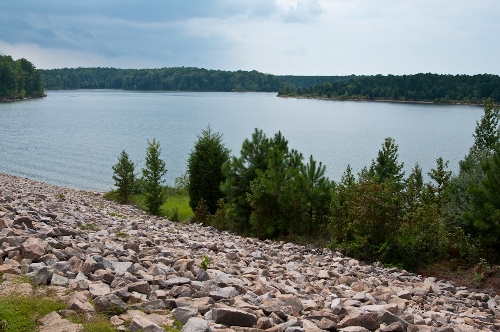Lifetime Fitness is looking to build its newest facility in the Falls Lake Watershed, which may result in more commercial development in the environmentally sensitive area.
If a rezoning is approved by the Planning Commission and the City Council, Lifetime Fitness will construct a facility just south of Interstate 540 off of Falls of Neuse Road. The 26-acre property is zoned rural residential and doesn’t allow for commercial development.
A decision by the Planning Commission has been deferred for two weeks to tweak some language in the proposal.
The facility would include a gym, spa, outdoor and indoor swimming pools, racquet courts and a cafe. There would also be a parking lot with more than 550 spaces.
Today, a golf driving range and miniature golf course sit on the property.
Raleigh’s deputy planning director, Ken Bowers, explained that as a general rule, only single-family houses on large lots — one acre or more — are allowed to be built in the watershed. As it is zoned today, 27 single family houses could be built on the same property.

Jennifer Wig
Falls Lake, as seen near the dam. Photo by Jennifer Wig.
Development and Water Quality
Development has an effect on water quality, which is why it is often limited in watersheds. When it rains, stormwater runs off impervious surfaces, such as roofs and parking lots, and makes its way into nearby lakes and streams, taking with it dirt, chemicals and other pollutants often found on the ground. Eventually this rainwater ends up in Raleigh’s water supply, or the water supply for other cities and towns down the watershed.
Commercial development has the tendency to increase the amount of impervious surface, thanks, in part, to the required parking.
It’s for these reasons, Bowers said, the city generally doesn’t allow commercial development in the watershed.
To lessen the impact on the water quality, stormwater management devices are required for all developments. These devices can be wet ponds, underground filtration, large cisterns or a variety of other devices that would lessen the amount of nitrogen and phosphorus leaving the site. Developers can also buy credits that would put money toward the state’s ecosystem enhancement program. Many developers do a mix of these things.
Lifetime Fitness won’t be buying any credits and all of its stormwater management will be done on site, using the back two-thirds of the property.
Bill Hunt, an N.C. State researcher who is assisting with the design of the project, said the property will include a mix of devices, including ponds and wetlands and building up the tree canopy. The water captured on site will also be used for irrigation.
“I’m really confident that it’s going to be better than what’s currently there,” said Hunt, who plans to monitor and study the property for almost two years after it is built.
The goal, he said, is to have enough stormwater management in place that it would result in less nitrogen and phosphorus leaving the site than what would be allowed.
The project would be similar to the Whole Foods in North Raleigh, which boasts a number of stormwater treatment devices, including the massive cistern that sits next to the building. Hunt studied the effects of that system for a year and concluded that the site produces a result 30 times better than that of the site next door, which only has a wet pond.
The system “works better than I would have even have guessed,” he said.
Setting a Precedent
If the project is built, it could open up the door for more rezoning that would allow commercial development in the watershed.
“It could set a good or bad precedent depending on how you look at it,” said Councilor Russ Stephenson, who has been speaking with experts on both sides of the issue. “I don’t have a clear answer on what to do.”
Planning Commissioner Adam Terando said his overriding consideration is if the project is “still achieving the objectives of keeping the pollution and the runoff rates at or below the acceptable levels that we’ve agreed upon.”
If the city is going to allow development in the watershed, that development has to meet certain criteria.
In this case, he said, the standards would bring runoff to a pre-development level.
Terando said the project would set a precedent for future development, but it will create a high set of standards for future projects. More developers could apply for rezoning in the watershed but, “if they don’t have the same standards, I’m going to be right there at the forefront voting it down.”
Terando said that the intensity of the project is still a concern and it should be thoroughly reviewed by City Councilors before making a decision.
The case will be discussed again at the next Planning Commission meeting on March 26.
